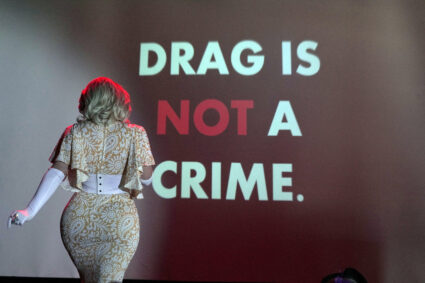
The Rock & Roll Hall of Fame has announced its 2026 list of nominees, and it mixes pop, rap, metal,…

HOUSTON (AP) — A federal judge on Thursday temporarily blocked a new Texas law that drag show artists fear will be used to shut them down or put them in jail.
The law, approved by the Republican-controlled Legislature, would expand the legal definition in the Texas criminal code of what is considered to be an illegal public performance of sexual conduct in front of children. It is part of a broader effort in Texas and other conservative states to crack down on drag shows and limit LGBTQ rights.
Critics argued that the definition is so broad, it could include the Dallas Cowboys cheerleaders.
U.S. District Judge David Hittner in Houston issued the temporary restraining order after a group of drag performers and LGBTQ+ rights advocates sought to keep the law from taking effect on Friday.
They say the law unconstitutionally threatens the "livelihood and free expression of many Texans, including drag performers across our state."
The Texas injunction follows similar rulings against drag performance bans in states including Florida and Tennessee.
The new Texas law on sexual content in performances was promoted as a way of protecting children from seeing drag shows. Republican lawmakers amended it in response to criticism to remove some specific references to drag performances, but the sponsor's "statement of intent" still cites a need to protect children from seeing drag shows, and the final text broadened the scope of what's illegal in ways that would also cover many other performances done in front of children.
For example, it defines sexual conduct to include sexual gestures that use "accessories or prosthetics that exaggerate male or female sexual characteristics." The law also criminalizes real or simulated groping, real or simulated arousal, and the display of a sex toy if done in a "prurient" manner in front of a minor or on public property at a time and place where the performance could reasonably be expected to be viewed by a child.
Violators could face up to a year in jail, and businesses hosting performances deemed illegal could be fined $10,000 for each violation.
Like Texas, Arkansas has a new law regulating adult-oriented performance that doesn't mention drag specifically but has raised concerns that it would be applied to drag performances. And Montana has a ban in effect that targets drag queen story hours, specifically.
The law's sponsor wrote that "the bill is not intended to stop theatrical or other similar exhibitions," even though it explicitly prohibits local governments from authorizing a "sexually oriented performance," according to its new definition, in the presence of people under 18 years old.
The lawsuit argues that the new law could ensnare television, movies and websites as well as all kinds of performances in addition to drag shows, including touring Broadway plays, karaoke nights, and restaurants staffed by scantily clad servers.
Sustain our coverage of culture, arts and literature.